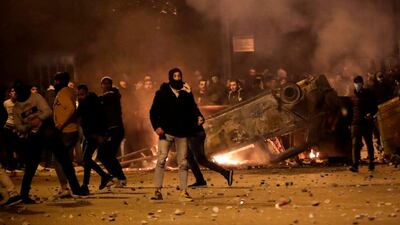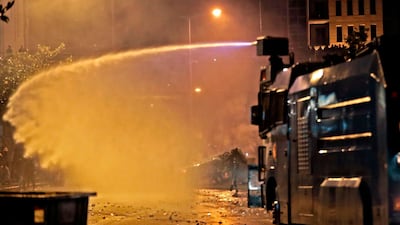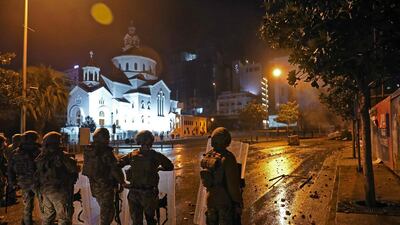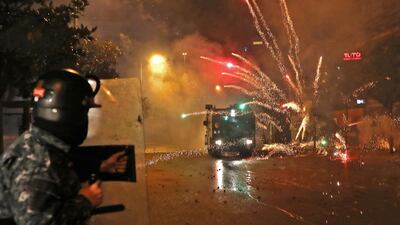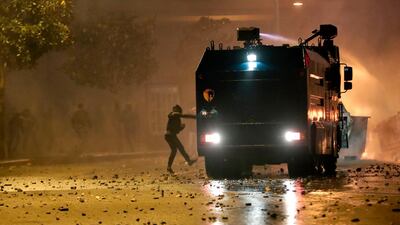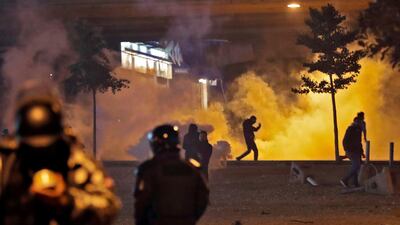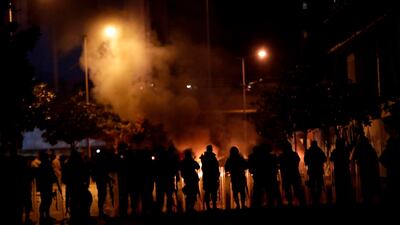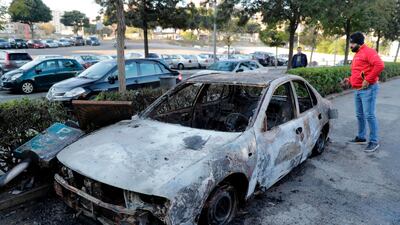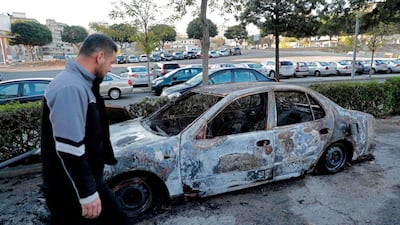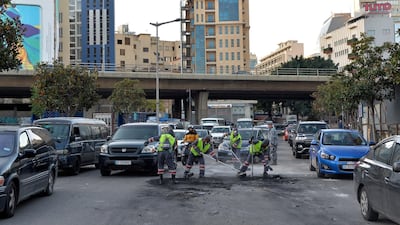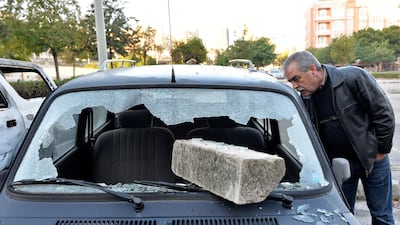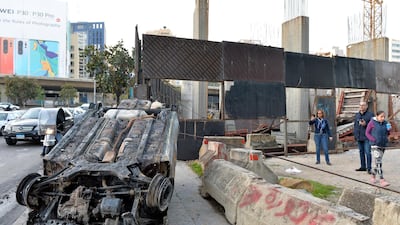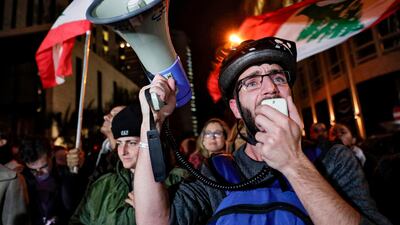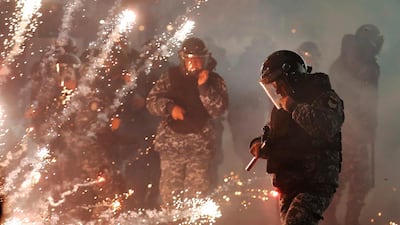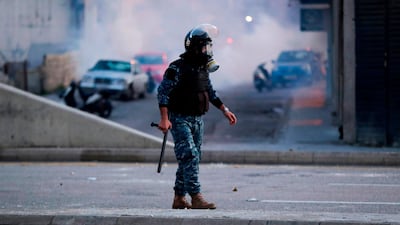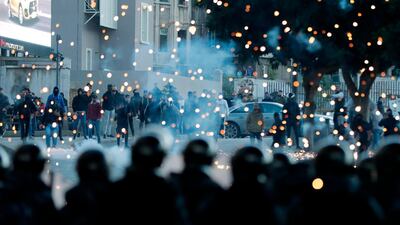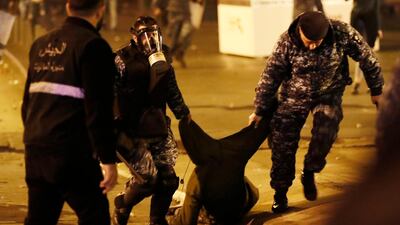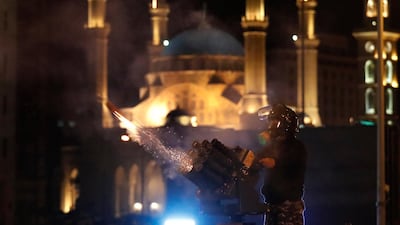Through the clouds of tear gas in central Beirut, the speakers of the main mosque in the neighbourhood of Khandaq Al Ghamiq echoed with a call for the gangs of men fighting police to leave the streets.
Hundreds of supporters of Lebanon’s two main Shiite parties, Amal and Hezbollah, brawled in the streets with police and protesters after a video shared online showed a man insulting important Shiite figures.
At least three cars were set on fire, one reportedly after it drove into the groups of men. Police were pelted with stones and fireworks and responded with tear gas and water cannon.
Amal and Hezbollah called on the men to go home and not to allow the anger to turn Lebanon’s economic and political crisis into a sectarian conflict. But the men remained.
As the speakers of the mosques in Khandaq Al Ghamiq crackled into life with calls for the supporters to return home, Shiite clerics also took to the streets that lie just above Downtown Beirut – the centre of the now two-month protest movement against corruption and the government.
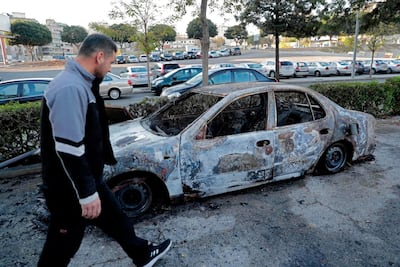
Civil Defence said it treated 43 people and took 23 to hospital. The man in the video said he was from the Sunni-majority city of Tripoli but senior religious figures in the northern town condemned the clip.
"We tell our people in the Shiite community that those who harm ... are not from us and do not represent the Sunni sect, have nothing to do with the sect and do not express the Sunni opinion,” Sheikh Hasan Merheb, a senior sheikh from Dar Al Fatwa, told local TV channel Al Jadeed.
Protests sparked by the video also broke out in the south and the Bekaa Valley. In southern Nabatiyah, unidentified men burnt down a protest camp; similar incidents were reported in other areas.
Monday was the third consecutive night of violence in the area around Parliament and came hours after President Michel Aoun announced yet another delay to talks on naming a successor to caretaker prime minister Saad Hariri who resigned on October 29.
The country’s main Christian groups said they refused to back Mr Hariri. Mr Hariri's office said he is keen for national accord and would not be nominated to the post “without the participation of any of the large Christian blocs”.
Although Mr Hariri remains the most likely candidate to be selected, increasing anger on the streets from protesters made it clear they will not accept him returning for a fourth term.
Protesters demand a Cabinet of independent technocrats and an independent head of government not affiliated with the existing parties.
The postponement of talks followed a violent weekend that included the toughest crackdown on demonstrations in two months.
The Lebanese security forces repeatedly used tear gas, rubber bullets and water cannon to disperse hundreds of protesters in Beirut.
Groups of political supporters again descended from Khandaq Al Ghamiq and fought with protesters. Unlike previous occasions when political supporters have overrun protest camps, the anti-government demonstrators stood their ground, throwing rocks and bottles at the men.
Although the protests had united sectarian and ethnic groups against the ruling elite, tensions surfaced from the start between the protesters and supporters of the Shiite groups Hezbollah and Amal, after they rejected criticism of their leaders.
However, the weekend’s fighting marks a significant departure since the protests began in early October as they have, until now, remained largely peaceful except for sporadic incidents.
The UN special coordinator for Lebanon, Jan Kubis, warned that because of the collapsing economy, such postponements are “a risky hazard both for the politicians but even more so” for the people.
Lebanon is enduring its worst economic and financial crisis in decades with massive debt, widespread layoffs and unprecedented capital controls imposed by local banks amid a liquidity shortage.
In a sign of the hardening mood and the frustration at the failure of politicians to meet the demands of protesters, members of the audience at a Christmas concert at the American University of Beirut on Sunday evening hounded former Lebanese prime minister Fouad Siniora out.
Mr Siniora, an alumnus of the university, sat impassively on the front row as audience members erupted in chorus against him but eventually bowed to the pressure and left the concert hall with his bodyguards.
"How dare they have the nerve to come to a concert when they know that people hate them. How dare they?" Terese, a retired teacher, told Reuters. "We started chanting: 'revolution, revolution, Siniora get out' ... he didn't budge."
A performance by composer and pianist Guy Manoukian was interrupted by the uproar from the audience. Once Mr Siniora left, the concert began in earnest.
Mr Siniora later sent a tweet saying history would prove that he had always worked in Lebanon's interests though he may have made some mistakes.
Before serving as prime minister from 2005 to 2008, Mr Siniora was a long-time finance minister. He was questioned last month by a state prosecutor over how $11 billion (Dh40.4bn) in government funds was spent while he was in power.
His office has said the spending was entirely legal.
Shows of hostility towards senior figures such as Mr Siniora, who once commanded respect, have broken taboos in Lebanon, setting the current wave of demonstrations apart from previous dissent.
The presence of Mr Siniora, a former banker and one of the country's wealthy elite, showed indifference to the suffering of many people, some concertgoers said.
"Politicians should understand that they have become distanced from the people," said Maestro Barkev Taslakian, conductor of Al Fayhaa Choir.
Many Lebanese politicians have avoided public gatherings for fear of being targeted by angry protesters. One audience member said it was a blatant provocation for a leading member of the establishment to attend the concert.
"They cannot ignore what's happening and attend and then pretend that actually they are not to blame," said entrepreneur Bahe Ghobril.
Mr Hariri had asked the International Monetary Fund and the World Bank for help developing a reform plan to address the economic crisis.
Moody’s Investors Service said that without technical support from the IMF, World Bank and international donors, it was increasingly likely that Lebanon could see “a scenario of extreme macroeconomic instability in which a debt restructuring occurs with an abrupt destabilisation of the currency peg resulting in very large losses for private investors”.
Lebanon's currency has been pegged at 1,507 Lebanese pounds to the dollar since 1997, but in recent weeks it has reached more than 2,000 in the black market. Lebanon’s debt stands at $87bn or 150 per cent of GDP.
